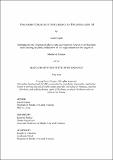Unlocking Collective Intelligence in Decentralized AI
Author(s)
Gupta, Gauri
DownloadThesis PDF (12.51Mb)
Advisor
Raskar, Ramesh
Terms of use
Metadata
Show full item recordAbstract
In the current evolving digital landscape, vast repositories of data and knowledge often remain siloed and untapped due to privacy concerns and centralized control. Thus, despite the transformative potential of artificial intelligence, its utilization in societal sectors lags behind other industries. For example in healthcare, data privacy and lack of incentives and trust in the system prevent collaboration on a large scale. This necessitates the development of efficient methods for decentralized learning while preserving privacy to generate wisdom whose quality is on par with the case of data centralization. It involves first identifying and creating essential building blocks that encourage collaboration while preserving the decentralized nature of these critical digital paradigms. A key challenge here is to facilitate collaboration among distrustful, disconnected, and disincentivized entities possessing distinct assets such as data, models, and computation resources. Harnessing the collective wisdom latent within decentralized networks will unlock new avenues for innovation and human collaboration. Therefore, the primary aim of this thesis is to expedite AI adoption in decentralized systems by introducing novel algorithms and systems capable of extracting collective intelligence while preserving privacy.
This thesis addresses the following research questions: First, it delves into methods for training machine learning models collaboratively while simultaneously protecting the privacy of raw data and the proprietary nature of individual models. Second, it explores the coordination mechanisms among system nodes in the absence of a central authority or trusted server to ensure orderly collaboration. Specifically, it answers questions like who should a node talk to. When does random collaboration selection work? Finally, it investigates strategies for conducting crowd-sourced decision-making to obtain population-level predictive results, scaling efficiently to encompass millions of agents.
Date issued
2024-05Department
Program in Media Arts and Sciences (Massachusetts Institute of Technology)Publisher
Massachusetts Institute of Technology